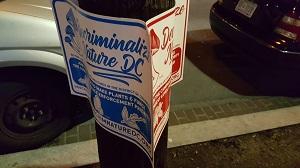Residents in the nation's capital will vote on whether to effectively decriminalize natural psychedelics, the Arizona pot legalization initiative survives a legal challenge, the Drug Policy Alliance pushes for federal drug decriminalization, and more.

Arizona Marijuana Legalization Initiative Fends Off Legal Challenge. The Smart and Safe Arizona marijuana legalization initiative has survived a legal challenge from foes. Maricopa County Superior Court Judge James Smith ruled late Friday that the measure's summary did not mislead voters and the measure can be on the ballot. "At 100 words, the summary also cannot include everything," he wrote. "That is why the full initiative must accompany the petition. This initiative is plain: It wants to legalize recreational marijuana," the judge wrote. "That is the principal provision. It is unlikely electors signing these petitions would be surprised by cascading effects of legalizing a formerly illegal substance."
Drug Policy
Drug Policy Alliance Proposes Federal All-Drug Decriminalization, Releases New Legislative Framework. The Drug Policy Alliance (DPA) released a new federal legislative proposal Dismantling the Federal Drug War: A Comprehensive Drug Decriminalization Framework, which provides a roadmap to effectively end the criminalization of people who use drugs and begin repairing the harm drug law enforcement has caused to communities of color. The DPA model decriminalization legislation -- the Drug Policy Reform Act -- takes the first steps in dismantling the punitive apparatus built up over the past 50 years. To begin refocusing federal drug policies, the legislation shifts the authority for classifying and regulating controlled substances from the Drug Enforcement Administration (DEA) to the National Institutes of Health (NIH) within the Department of Health and Human Services (HHS). The legislation eliminates criminal penalties for all possession of personal-use quantities of controlled substances, and shifts federal resources away from futile enforcement strategies to supportive initiatives to protect the public health and safety.
Methamphetamine
Senators Feinstein and Grassley File Methamphetamine Response Act. Senators Dianne Feinstein (D-CA) and Chuck Grassley (R-IA) last Thursday introduced the Methamphetamine Response Act, a bill declaring methamphetamine an emerging drug threat which would require the Office of National Drug Control Policy (ONDCP) to develop, implement and make public a national plan to prevent methamphetamine addiction and overdoses from becoming a crisis.
Psychedelics
Washington, DC, Natural Psychedelics Initiative Qualifies for the Ballot. The DC Board of Elections announced last Wednesday that Initiative 81, the Entheogenic Plant and Fungus Policy Act of 2020, has qualified for the November ballot. The act would effectively decriminalize the use and possession of natural psychedelics by making the enforcement of laws against them the lowest priority.
International
World Anti-Doping Association to Shorten Punishments for Recreational Drug Offenses. Beginning next January, the World Anti-Doping Agency (WADA) will no longer issue long suspensions for athletes testing positive for recreational drugs out of competition. Instead of being banned for two years, the athletes will now be banned for one to three months. "If the athlete can establish that any ingestion or use occurred out of competition and was unrelated to sport performance, then the period of ineligibility shall be three months," WADA's new code says. "In addition, the period of ineligibility calculated... may be reduced to one month if the athlete or other person satisfactorily completes a substance of abuse treatment program approved by the Anti-Doping Organization."
British Tory Drug Reform Group Calls for Rescheduling Psilocybin. The Conservative Drug Policy Reform Group (CDPRG) has published a new report with the Adam Smith Institute outlining the potential medical benefits of psilocybin and urging the UK Home Office to reschedule the compound for research purposes. The not-for-profit group also urges the Home Office to reduce regulatory restrictions on the compound to allow for research into its medical efficacy. The report is Medicinal use of psilocybin: Reducing restrictions on research and treatment.
Colombia's Former President Uribe Placed on House Arrest During Investigation of Ties to Drug Cartels, Paramilitary Groups. Last Thursday, President Ivan Duque announced that former President Alvaro Uribe will be held in custody as the Supreme Court investigates allegations of witness tampering. Uribe, president of Colombia from 2002 to 2010, has long been accused of criminal activities, including having ties to drug cartels and paramilitary groups. He is currently accused of being a founding member of a rightist paramilitary group involved in the decades-long conflict between the government and leftist rebels.
The Drug Policy Alliance is a funder of StoptheDrugWar.org.
This work by StoptheDrugWar.org is licensed under Creative Commons Attribution-ShareAlike 4.0 International
Add new comment